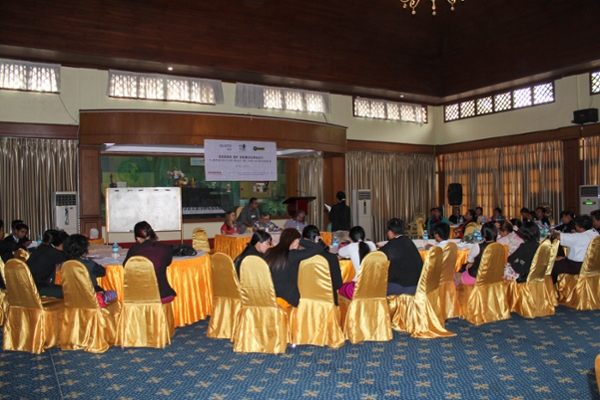Pathein Training Session
On Thursday, a group of us crammed into a van to head to the first training session at a hotel in Pathein. The group consisted of 11 people: law professors Tomáš Vachuda, of the Anglo American University in Prague, and Allen Snyder, from the University of San Diego; Allen’s son, Charles, a young lawyer from Los Angeles; trainers in training (TOTs) Khin Khin Kyaw, Aye Aye Thet, and Than Than Soe; Sabe Soe, the director and co-founder of Burma Center Prague (BCP) and BD, a project assistant; Marek Svoboda from the CEELI Institute; Aung Nay Mong, the interpreter, and—last but not least—yours truly. Although Pathein is not that far from Yangon, it took us at least 5 hours to get there by car. Two of those hours were spent in traffic within the city limits of Yangon.
The training session was coordinated by the Myanmar Lawyers Network, CEELI Institute, and BCP. The Transition Promotion Program, which is under the Ministry of Foreign Affairs of the Czech Republic, provided the majority of the funding required to conduct the training.
The goals of the training session were essentially two-fold. The first objective was to prepare young lawyers for their careers in the legal profession by honing their legal advocacy skills, and discussing the effect of changing political and legislative environments in Myanmar on the legal profession. The secondary objective was to further prepare the TOTs, so that they may run future training sessions without the assistance of foreign trainers. At the moment, the TOTs, all of whom are practicing advocates, simply observe and assist the foreign trainers.
Given that almost all of the executive board members for the MLN are men, I was surprised to see that a majority of the trainees (as well as all three of the TOTs) were women. There were about 37 trainees in total, consisting of 11 advocates, 12 high-grade pleaders, and 14 chamber apprentices. I did the math, and discovered that over 70% of the trainees were women.
The biggest takeaway for me from this weekend was how little these practicing lawyers knew about the fundamentals of legal advocacy. Their grasp of basic concepts—like formulating an argument and examining a witness—is tenuous at best. Hence, I was naturally curious as to how a person obtains a license to practice as a lawyer in Myanmar. This is what I learned from the trainees: First, one must get a four-year bachelors degree in law. Most of today’s lawyers in Myanmar were trained in substandard “distance learning” courses. Then, the graduate must complete a one-year chamber apprenticeship, which is generally considered a waste of time, given that interns usually only follow the mentor and perform menial tasks. After the internship, they must practice as a high-grade pleader for three years (they can only practice in district and township courts) in order to apply to practice in the high court as an advocate. Many lawyers choose to remain high-grade pleaders because they are unable to afford the fees and costs associated with obtaining and maintaining an advocate’s license.
Needless to say, due to the poor educational standards, many of the young lawyers that come to the training sessions are woefully ill equipped to practice law. It was only after seeing a training session first-hand that I was able to fully grasp how important this training initiative actually is.
